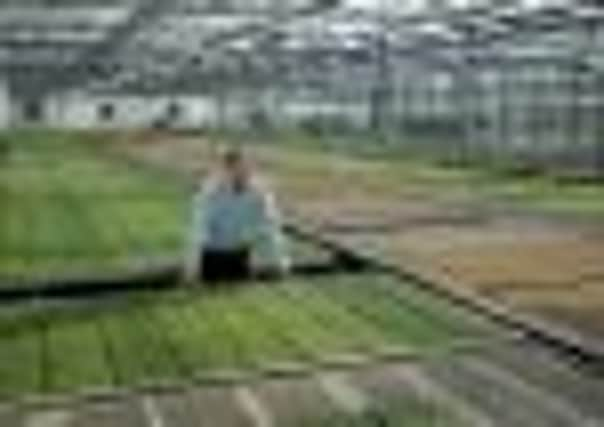Farm of the Week: Plugged in to the seed business


Earley Ornamentals is a trade-only supplier, selling seedlings which nurseries grow into plants for garden supplies outlets from your corner shop to B&Q. It is, in short, a potting shed – but one which turns over £4.5m and employs 30 people full-time and 30 more at this time of year, when green fingers are itching for spring planting.
Twenty years ago, pansies were yellow or blue and busy lizzies were an exotic rarity from Central America. Now pansies, and just about everything else, come in all colours – sometimes two or three at once – and garden-makers choose their ingredients from a world menu.
Advertisement
Hide AdAdvertisement
Hide AdThe annual swap of seeds and cuttings has been sidelined by the trundle of shopping trolleys. And the supply business has globalised and stratified.
The seed breeders and harvesters sell to the propagators, who sell to the growers. The staff at Earley Ornamentals, just off the A1, near Thirsk, may never see the flowers in their catalogue, which runs from Achillea to Zinnia. It includes a few flowering vegetables but, basically, “ornamentals” means flowers.
The job here is to turn seeds and cuttings into green shoots in a little plug of peat, and then move them on. It takes six acres under glass to produce 150m plugs a year. It would take 60 to do all the growing, too. However, most of the staff are keen gardeners, so they do try out their own products.
And Mr Earley, or one of his team, will make an annual shopping trip to look for flowers from which they want seed. He likes to have something new every year – an improvement if not a new product. This year’s innovation is a line of multi-coloured primroses from Australia, known as ‘Paradise Primulas’.
Advertisement
Hide AdAdvertisement
Hide AdThe Americans, the Japanese and the Dutch are all big suppliers of seed. They sell young plants, too, but the UK trade is pushing a new Home Grown logo which will certify, among other things, that germination has been done in this country.
Part of the sales pitch is that plants started here will grow better here, but much as he would like to give that one a scientific endorsement, Mr Earley cannot quite bring himself to do it. If you want to buy British, you do it for all the other good reasons.
He is one of a handful of big germinators in the UK ornamentals business, and possibly the biggest of the independents.
Like some of its rivals, Earley’s used to be part of a global network. A Japanese seed company, Sakata, acquired the Thirsk operation when it was a customer in danger of going out of business, and hired Mr Earley to run it. Now 49, he is a Dorset man, from a horticultural family, and worked for a Dutch company before moving to Thirsk, in 1996.
Advertisement
Hide AdAdvertisement
Hide AdThe relationship with the Japanese was a slightly awkward one, as they were selling to his rivals as well as to him, and he and his wife, Lorna, took an opportunity to buy the business back into British hands in 2008.
It freed them to operate as they wanted, and a new half-acre glasshouse is on the cards. That will be about £250,000, with the necessary heating, sodium lighting, spray booms, trolley tracks and so on. And the growing kit is only half the story.
A standard plug tray has 480 holes, and Earley’s customers will expect 475 of those to have a healthy seedling, because their replanting operation will often be a mechanical one. Mr Earley needs a “gapping up” machine which will scan a tray, blow out any blanks, using compressed air, and fill the gap from a donor tray. That is £140,000 worth of clever stuff.
When ready, the trays are loaded onto what are known as “Danish trolleys”: industry-standard tools which are traded around like pallets. The trolleys pack into delivery trucks which do the opposite of refrigeration, to keep the seedlings at a constant temperature.
Advertisement
Hide AdAdvertisement
Hide AdThe seeds need about 24C for germination and the seedlings are then moved through the houses until they end up hardening off at about 10C.
The March bill for heating oil will be about £35,000 and the end-of-year cost about £250,000. And heating oil has recently gone up to 63p a litre, compared with 45p a year ago.
Another long-term concern, although still only a cloud on the horizon, is Defra’s declaration of intent to phase out the use of peat. For this business, there is simply no good alternative, says Mr Earley. Defra has put a 2030 deadline on its ambition because nobody yet knows how to get there.
For the time being, Mr Earley needs peat, covered with a thin layer of vermiculite, to give his seeds the right micro-climate.
Advertisement
Hide AdAdvertisement
Hide AdHe buys his from an Irish dealer but it comes from a “sustainable source” in Latvia. The supplier has a certificate which says so. Why Latvian peat should be less important than ours is not his business.
At the moment, his main line is begonias.
He says: “A few years ago, busy lizzies were the main variety of bedding plant. But they developed this mildew problem and there is a big swing back to English standards like begonias, which are more or less bullet-proof.”
Fifty per cent of the company’s annual turnover is in March and April, and January and February are busy with preparation. But then there is a mini-rush over the summer, for autumn planting, and poinsettias to be ready for Christmas.
“So it only really leaves us October-December as a quiet period and then we have maintenance, plus we overwinter some stock for a shrub grower.”
And all that roof glass has to be steam-cleaned four times a year, by a contractor walking the gutters.